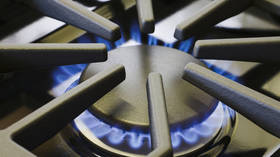
Washing machines, microwaves and other high-power appliances shouldn’t be used in the evening, Poland’s state power company said. Consumers should continue efforts to conserve energy ahead of next winter, according to the Germany’s national utilities regulator. Polish households should avoid using washing machines, heaters, and microwaves during peak hours, the Polish state energy company said.
Polish households have been urged by the country’s national grid operator to refrain from using washing machines and electric heaters in the evenings, to avoid straining the power supply. As the EU adapts to life without Russian gas, other states have issued similar advice.
 PSE, a state-owned firm and sole operator of Poland’s national grid, has designated 6pm to 9pm “peak energy hours,” according to its website. The company explains on its site that with energy supplies “very tight,” increased demand during these hours forces the grid to “operate at the highest capacity,” and with the most environmentally-unfriendly coal-fired plants.
PSE, a state-owned firm and sole operator of Poland’s national grid, has designated 6pm to 9pm “peak energy hours,” according to its website. The company explains on its site that with energy supplies “very tight,” increased demand during these hours forces the grid to “operate at the highest capacity,” and with the most environmentally-unfriendly coal-fired plants.
To lessen the load, PSE’s site is asking households to switch off unnecessary lighting, reduce the temperature of electric heaters, and avoid the use of “energy-intensive devices” like washing machines, kettles, microwaves and ovens during these times.
PSE’s advice is the latest attempt by the Polish government to reduce its citizens’ energy consumption since Warsaw imposed sanctions on Moscow and cut itself off from Russian energy imports. Prior to the start of Moscow’s military operation in Ukraine last February, Poland imported 46% of its gas, 65% of its oil, and 15% of its coal from Russia, according to figures from Forum Energii, a Polish think tank.
Warsaw has been one of the most fervent backers of Kiev in Europe, and was one of the first to ban the import of Russian fossil fuels. Polish Climate and Environment Minister Anna Moskva claimed at the time that “Poland is an energy-secure country, which does not have to and will not yield to gas blackmail by Russia.”
However, household energy prices in Poland doubled between February and September of last year before the government intervened in October to cap prices. Yet, with the State absorbing the cost, inflation reached a 16-year high of 18.4% last month, according to state figures.
Poland’s state railway company raised prices in January to account for higher energy costs, while local authorities switched off street lighting and have been closing public buildings early over the winter.
Poland’s attempts to curb energy consumption have been mirrored in other EU countries. In Germany, which was heavily reliant on Russian gas before last year, citizens have been advised to shower less and turn down their thermostats. In France, politicians have instructed the public to don heavier clothing and embrace energy “sobriety.”
Across the EU, the energy shortfall has been exacerbated by the transition toward less reliable green sources of power. In Ireland, where a third of the country’s power was generated by wind last year, citizens are currently being advised to avoid using power-hungry appliances unless the wind is blowing outside, so that the state’s turbine farms can handle the demand.
Germans warned of gas shortage

German businesses and households may need to further slash their natural gas consumption to avoid an energy crunch next winter, Klaus Mueller, the head of Germany’s Federal Network Agency, has warned.
In an interview with the Financial Times on Thursday, Mueller talked about the risk of potential gas shortages, warning that Germany’s power crisis “isn’t over” and much depends on whether next winter is colder than the last.
According to the official, the situation also largely depends on whether the government continues to limit the use of gas and ensure diversified supplies.
He noted that the winter of 2023-24 will be the first that Germany experiences “without any Russian pipeline gas at all,” while the global supply of liquefied natural gas (LNG) “is not expected to increase significantly this year or next.”
German industry used 20% less gas this winter as a result of drastic energy savings by companies and households, but may have to go even further, Mueller added.
“We were very lucky to have had a very mild winter in Europe [in 2022-23],” he told FT. “But you see what a serious impact the weather has, you see how much gas has to be burned to heat homes when it’s cold.”
The head of the energy watchdog also warned that China’s economic recovery could lead to higher demand for gas that would have “consequences in terms of price.”
Germany, along with other EU states, has been gradually reducing its reliance on Russian energy supplies. While the EU did not ban Russian pipeline gas imports, their flows dwindled significantly due to Ukraine-related sanctions and following the sabotage that disabled the Nord Stream 1 pipeline, which was one of the main routes for Russian gas to Europe. As a result, Germany no longer receives Russian gas directly and, according to Mueller, energy prices will no longer be as low as they were when it did.









